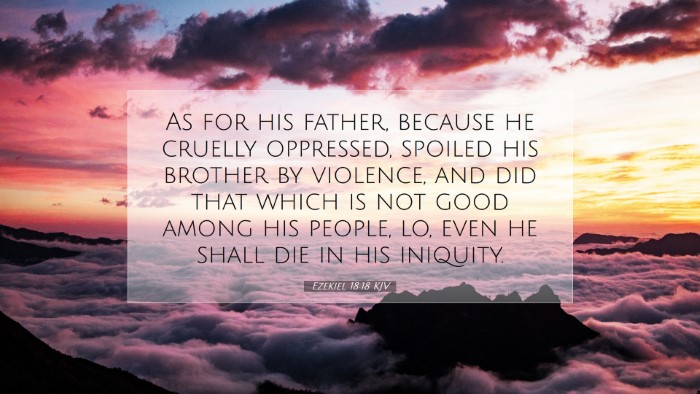Commentary on Ezekiel 18:18
Ezekiel 18:18 (KJV): "As for his father, because he cruelly oppressed, spoiled his brother by violence, and did that which is not good among his people, lo, even he shall die in his iniquity."
This verse arises in a profound context within Ezekiel's call to repentance, emphasizing personal responsibility and the distinction between the fate of the righteous and the sinner. The following commentary seeks to glean meaningful insights that can be applied in a robust theological context.
Context and Background
The Book of Ezekiel is predominantly addressed to the exiled community in Babylon. Ezekiel, as a prophet, seeks to dismantle the prevailing notion that children inherit the moral and spiritual failures of their parents. The verses surrounding 18:18 elucidate the theme of individual responsibility in God's justice system.
Individual Responsibility and Divine Justice
Matthew Henry emphasizes that the verse illustrates a central theme of personal accountability before God. The sins committed by the father—a notable figure in society—result in his own demise due to his iniquities. This rejection of hereditary guilt serves as a theological pivot, informing that each person bears the weight of their own actions. The father’s cruelty and oppression mirror the sinfulness observed in society which leads to divine judgment.
Albert Barnes highlights the importance of understanding the nature of God’s justice. It underscores that God does not punish the innocent for the sins of the guilty. The phrase "even he shall die in his iniquity" suggests that the consequences of sin are painfully individual, arising not from external circumstances but from a personal disconnection from righteousness. Here, the emphasis is on the character of God as just and fair, preventing any notion of arbitrary divine retribution.
The Role of Repentance
In the broader narrative of Ezekiel's prophecy, the call to repentance is paramount. Adam Clarke posits that the grim fate of the father due to his oppression serves to invoke a serious reflection on the nature of repentance and relational integrity. Clarke notes that the passage encourages the exiles to turn away from the sins of their predecessors and form a new identity grounded in justice, love, and right conduct.
Practical Applications
- For Pastors: This text can be a powerful resource when addressing congregational sin and negating the excuse of inherited guilt. Preaching on personal responsibility, aligning congregational actions with biblical teachings, offers a path to communal healing.
- For Theology Students: Exploring the theological implications of Ezekiel 18:18 enables a deeper understanding of soteriology and the character of God, elucidating how divine justice balances with mercy.
- For Scholars: This verse invites critical engagement with the intersection of ethics and divine law. Understanding its implications in historical context can yield insights into social justice issues today.
Conclusion
Ezekiel 18:18 provides a nuanced exploration of personal accountability within divine justice. The rich insights gleaned from traditional commentaries deepen the understanding of this text, resonating with ongoing discussions about ethics, righteousness, and the nature of God’s justice in a broken world. It challenges leaders and laypeople alike to examine not only their actions but also the implications of their communal and spiritual legacy.


